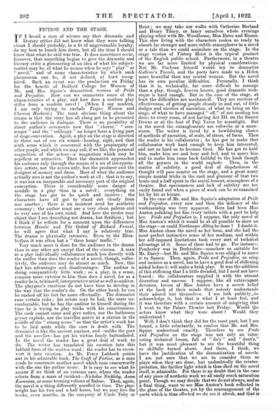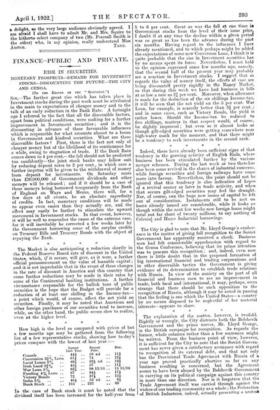FICTION AND THE STAGE.
IF I heard a man of science say that dramatic and literary critics did not know what they were talking about I should probably, in a fit of ungovernable loyalty, do my best to knock him down, but all the time I should know that what he said was true. It does sometimes occur, however, that something begins to give tho dramatic and literary critic a glimmering of an idea of what his subject- matter may be, of what he means when ho says " play ' or " novel," and of some characteristics by which such phenomena can be, if not defined, at least recog- nized. Such an event was the production on Friday for the benefit of Bedford College for Women of Mr. and Mrs. Squire's dramatized version of Pride and Prejudice. How can we enumerate some of the characteristics of a play, and how does a modern play differ from a modern novel ? (When I say modern, I am only trying to exclude Trojan Women and Clarissa Harloive.) The most obvious thing about the drama is that the story has all along got to be presented to the audience in dialogue. There is no possibility of direct author's comments now that " chorus," " mes- senger " and the " soliloquy " no longer form a living part of stage convention. Again, a play on the stage is directed to three out of our six senses—hearing, sight, and that sixth sense which• is concerned with the propinquity of other people, and which we may call, if we like, the personal magnetism of the actors—a magnetism which may be repellent or attractive. Then the dramatist approaches his audience only through the means of a set of interpreta- tive artists, not the actors only, but the producer and the designer of scenery and dress. Most of what the audience actually sees is not the author's work at all ; that is to say, it was not an inseparable and necessary part of the original conception. There is considerably more danger of muddle in a play than in a novel ; everything on the stage 'has got to be quick and incisive ; the characters have all got to stand out clearly from one another ; there is an insistent need for aesthetic economy ; the author must use a very clean palette and be very sure of his own mind. And here the reader may object that I am describing not drama, but Scribism ; but I think if he reflects for a moment upon the differences between Hamlet and The Ordeal of Richard Feverel, he will agree that what I say is relatively true. The drama is physically intensive. Even to the Eliza- bethan it was often but a " three hours' traffic."
Very much more is done for the audience in the drama than in any other art except that of the cinema. A man at a play individually collaborates much less directly with the author than does the reader of a novel, though, collec- tively, the audience may do almost as much. Now, this fact has advantages and disadvantages. The auditor is doing comparatively little work ; so a play, in a sense, remains more exterior to him than does a novel, for as a reader he is, to himself, interpretative artist as well as auditor. The playgoer's emotions do not have time to develop in the way that the reader's do. On the other hand, he can be rushed off his feet far more effectually. The dramatist runs certain risks ; his actors may be bad, the seats un- comfortable, but he has the auditor to himself during the time he is trying to play tricks with his consciousness. The cook cannot come and give notice, nor the bathroom geyser explode, nor the traveller, arrive at a station in the middle of the " strong scene " so that the artist's work has to be laid aside while the case. is dealt with. The dramatist is like the ancient mariner, and—unlike the poet and the novelist—has got his victim firmly buttonholed. In the novel the reader has a great deal of work to do. The writer has translated his emotion into this tabloid form of the written word : the reader has to recon- vert it into emotion. As Mr. Percy Lubbock points out in his admirable book, The Craft of Fiction, as a man reads he constructs another novel which runs concurrently with the one the author wrote. It is easy to see what he means if we think of 'an extreme case, where the reader selects from a mass of incident—Nickolas *Nickleby, Anna Harenina, or some teeming volume of Balzac. Then, again, the novel is a thing differently unrolled in time. The play- wright has his two, and a:half hours, but we may live for weeks, _ even months, in the company of Uncle Toby or Heist ; we may take our walks with Catherine Morland and Henry Tilney, or fancy ourselves whole evenings playing whist with Mr. Woodhouse, Miss Bates and Emma. This slow living with the characters makes us ready to absorb far stranger and more subtle atmospheres in a novel or a tale than we could assimilate on the stage: In the stage version of Victory Heist is the typical product of the English public school. Furthermore, in a theatre we are far more limited by physical considerations. Not Mr. Cochran himself would try to dramatize Gulliver's Travels, and the poets have made us a Helen more beautiful than any mortal woman. But the novel has its own peculiar difficulties. Personally, I think that it is, technically, far more difficult to manage than a play, though, heaven knows, good dramatic tech- nique is hard enough. But in the case of the stage, at least the difficulties are mechanical. They are matters of effectiveness, of getting people cleanly in and out, of little dodges and niceties of narration, of what to bring on the stage, of what to have managed " off," of not needing ten doors to every room, of not having Act III. on the Sussex Downs or at the foot of Fuji Yama by moonlight. But in the novel the entanglements are cobwebs or a snow-. storm. The writer is faced by a bewildering choice of methods of narration, of scale, of stress, of focus. Then the reader is his collaborator ; he has got to make that collaborator work hard enough to keep him interested, and not so hard as to become tired. He has got to hold him, make him see and hear and feel, and to move him and to make him come back faithful to the book though all the geysers in the world explode. Then, in the matter of subtlety, a good deal of slapdashness of thought will pass muster on the stage, and a great many simple mental tricks in the rush and glamour of that two hours and a-half spent in the social, lenient, atmosphere of a theatre. But speciousness and lack of subtlety are too easily found out when a piece of work can be re-examined bit by bit at leisure.
In the case of Mr. and Mrs. Squire's adaptation of Prido. and Prejudice, every now and then the delicacy of the workmanship was very apparent. Here had been Miss Austen polishing her fine ivory tablets with a poet to help her. Pride and Prejudice is, I suppose, the only novel of Miss Austen's which it would be at all possible to show on the stage:--or could Northanger Abbey be done ? I doubt it. Miss Austen chose the novel as her form, and she had the most perfect instinctive sense of her medium, and within her self-imposed limitations took every sort of technical advantage of it. Some of these had to go. For instance, Pemberley was in Derbyshire—somehow so suitable for Mr. Darcy—but Mr. and Mrs. Squire were obliged to move it to Sussex. Then, again, Pride and Prejudice, so crisp and incisive as a novel, has to have a good deal of stiffening added before ih will make a brisk play. It was the addition of this stiffening that I a little dreaded, but I need not have feared : the collaborators supplied it with the utmost discretion and success. I suppose, like all extravagant devotees, lovers of Miss Austen have a secret belief at the back of their minds that nobody understands their adored but themselves. I am loth publicly.„to acknowledge it, but that is what I at least feel, and it was therefore with a certain amount of misgiving that I went to the Palace Theatre last Friday. Would tile actors know what they were about ? Would they understand ?
Well, I don't think they did for the most part, but I am bound, a little reluctantly, to confess that Mr. and Mrs. Squire understood exactly. Therefore to see Pride and Prejudice on the stage was not only an "inter- esting technical lesson, full of " do's " and " dent's," but it was most pleasant to see the beautiful thing so skilfully turned about. And there, I think, wo have the justification of the dramatization of novels. I am not sure that we are to consider them as plays when they are done, but undoubtedly the-reinter- pretation, the further light which is thus shed on the novel itself, is admirable. For there is no doubt that in the case of any piece of aesthetic work we all easily reach saturation point. Though we may decide that we do not always, and as a final thing, want to see Miss Austen's book reflected in the glass of the theatre, yet by the rearrangement of the parts which is thus effected we do see it afresh, and that is a delight, as the very large audience obviously agreed. I am afraid I shall have to admit Mr. and Mrs. Squire to the hitherto select company of two (Mr. Pearsall Smith is the other) who, in my opinion, really understand Miss Austen. TARN.



































 Previous page
Previous page